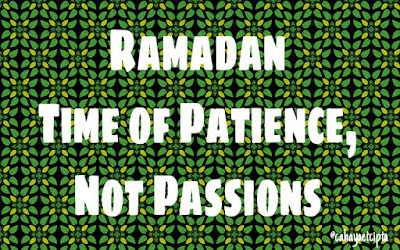A neighbor came to me one day during the Ramadan month, bringing some food for me to end my fasting for the day.
Feeling grateful I said, "I wish I could give you something in return."
Neighbor : "Oh, please don't mention it. We know you don't have much time to prepare meal for yourself.".
Giving each other a present during certain occasions is a very old tradition. It exists in almost every civilization and culture.
During the month of Ramadan of the Islamic calendar, the month for fasting, and the Eidul Fitr celebrations that follow, it is a common practice among Indonesians, Muslims or Non-Muslims, to exchange foods with their neighbors. This usually happens in late afternoons just before they break their fasting of the day. In the old days, foods were put in some containers, and the receiver would empty the contents and replace them with their own foods for the giver. Time changed and this tradition of giving gradually shifted from giving foods to giving presents.
Giving presents is a unique experience. Before you decide to give a present to someone, it is not uncommon for you to find yourself in a difficult situation. Would they accept this if I gave this, you would wonder. Or, should I give money instead. Would they think I am ungenerous if I gave them this or would they feel humiliated because of my gift?
Thousands of doubtful questions might whirl in your head before you decide what you are going to give out. But if you realize that the essence of giving is to show that you care for others, those questions are baseless. We give them presents because we care for them, because we love them. A gift is a symbol of love and care and of solidarity, as long as we give it sincerely.
Oh well. Are there insincere gifts? Yes, no doubt about it. The Ramadan and Eidul Fitr celebrations have apparently become an opportunity for certain groups of people to take advantage of giving. For some business persons, it is a time to get closer attention from those in power by giving them presents. For others, it is a time to produce goods that might cause people to buy them as gifts. They design the goods in parcels in such artistic ways as to attract buyers. They contain anything from food to drink and from shirts to watches, or anything you can think of, you name it. The parcels are then sold at prices ranging from hundreds of thousands of rupiahs to millions. Stores are full of potential buyers, those craving for buying those goods. Much more than on normal days, The Ramadan month, which basically is a time for patience, self-restraints and abstinence, has become a time for spending uncontrollably. A time for spiritual self-control into a time of worldly out-of-control. A time of patience into a time of passion. The business world has conditioned this, because it is them that gain the most.
Thanks God, recently the government has issued a regulation that bans government officials from accepting parcels. Or they might risk ending up in jail under corruption charges. Common people are also reminded of the true meaning of fasting, i.e. absent from food, sexual desire and extravagance.
Happy Ramadan and Eidul Fitr !




Nice posting, Liz, but please list your link on FED Challenge under "Comment", as the other do. thank you.
BalasHapusAgree if Ramadhan so special for us to be patient and also giving charity with the others
BalasHapusAaah reading ur post, I reminiscing at my mom's house, give some food to the neighbours as our habit :)
BalasHapusBetul mbak .. Menjaga sabar dan tdk mengumbar napsu :)
BalasHapusDuring Ramadan people tend to have get-together a lot. And that makes them more intimate to others.
BalasHapusThanks for sharing.
In my neighborhood, the habit of exchanging foods still remains toward Eid al-Fitr. It's very nice to know there are still kind people surround us.
BalasHapusagree with u, Mom..
BalasHapusvery nice reminder :D